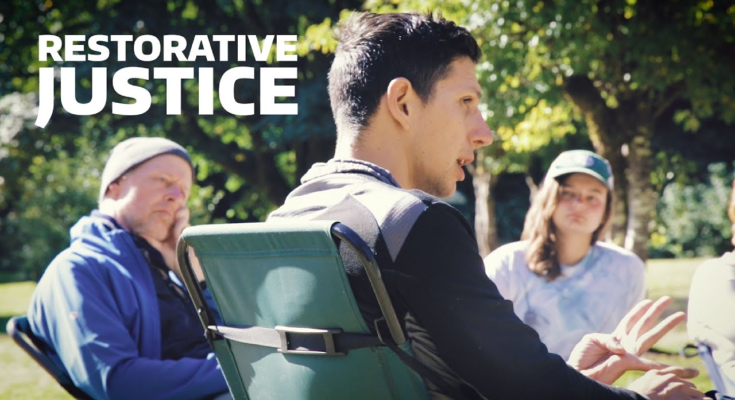Restorative justice is an evolving paradigm in the field of conflict resolution that emphasizes healing and reconciliation over punishment. It offers an alternative approach to traditional punitive methods and is increasingly gaining recognition and acceptance worldwide. To become an effective practitioner in the field of restorative justice, professionals often seek professional certificates. Professional Certificate in Restorative Justice provides comprehensive training, enhance skills, and offer a deeper understanding of restorative justice principles.
In this article, we will explore the significance of professional certificates in restorative justice, their role in shaping practitioners, and their impact on communities.
Understanding Restorative Justice
Before delving into the importance of professional certificates in restorative justice, it is essential to grasp the core principles and values of this transformative approach to conflict resolution.
Restorative justice is rooted in the idea that harm caused by wrongdoing affects not only individuals but the community as a whole. Instead of focusing solely on punishment, it seeks to address the needs of all parties involved: the victim, the offender, and the community. Key principles of restorative justice include:
- Healing and Restoration: The primary goal is to repair the harm caused by an offense and facilitate the healing process for victims, offenders, and the community.
- Inclusivity: Restorative justice involves all stakeholders, allowing them to have a voice in the resolution process.
- Accountability: Offenders are encouraged to take responsibility for their actions and make amends to those they have harmed.
- Community Involvement: Restorative justice recognizes the importance of involving the community in addressing conflict and harm.
- Transformative Justice: The focus is on changing behavior and addressing the underlying causes of wrongdoing to prevent future harm.
The Role of Professional Certificate in Restorative Justice
Professional certificate in restorative justice serves as a crucial bridge between theory and practice. They equip individuals with the knowledge, skills, and ethical foundation necessary to engage effectively in restorative processes. Here are some key aspects of the role of professional certificates in the field:
- Comprehensive Training: Restorative justice certificates provide a structured curriculum that covers various aspects of the field, including its history, theories, and practical applications. This comprehensive training ensures that practitioners have a well-rounded understanding of the subject matter.
- Skill Development: These certificates offer practical skills training in facilitation, communication, conflict resolution, and other essential competencies. These skills are vital for conducting successful restorative justice processes.
- Ethical Guidance: Restorative justice is guided by strong ethical principles, such as neutrality, impartiality, and ensuring the well-being of all involved parties. Professional certificates emphasize these ethical standards to ensure that practitioners maintain the highest level of integrity.
- Legal Knowledge: Understanding the legal framework surrounding restorative justice is critical. Professional certificates often include modules on relevant laws and regulations, ensuring that practitioners operate within legal boundaries.
- Experience and Practice: Many certificate programs incorporate supervised practice sessions, allowing participants to gain hands-on experience in facilitating restorative processes. This experiential learning is invaluable for building confidence and competence.
The Impact of Professional Certificate in Restorative Justice
The impact of professional certificate in restorative justice extends far beyond individual practitioners. These certificates have a ripple effect, positively influencing the community, justice systems, and society at large. Let’s explore the various dimensions of this impact:
- Enhancing the Quality of Restorative Practices
Professional certificates ensure that practitioners are well-prepared to facilitate restorative processes effectively. This translates into higher-quality interventions, leading to greater satisfaction among victims, offenders, and community members. Restorative justice is most successful when conducted by trained and knowledgeable professionals.
- Reducing Recidivism
Restorative justice has been shown to be effective in reducing recidivism rates. When offenders engage in meaningful conversations with their victims and take responsibility for their actions, they are more likely to make positive changes in their behavior. By equipping practitioners with the skills and knowledge they need, professional certificates contribute to breaking the cycle of reoffending.
- Community Building
Restorative justice emphasizes community involvement in conflict resolution. When practitioners receive professional certificates, they are better equipped to engage and collaborate with the community. This not only builds trust but also strengthens the social fabric, fostering a sense of collective responsibility for maintaining peace and harmony.
- Alternative to Traditional Justice
The criminal justice system can be adversarial and punitive, often leaving victims and offenders dissatisfied. Professional certificates in restorative justice empower individuals to offer an alternative approach that focuses on healing, reconciliation, and accountability. This not only benefits those directly involved but also contributes to a more compassionate and just society.
- Victim-Centered Approach
Restorative justice places victims at the center of the process, acknowledging their needs and desires. Professional certificates guide practitioners in providing the necessary support and attention to victims, helping them to heal and find closure.
- Balancing the Scales of Justice
Restorative justice seeks to balance the scales of justice by holding offenders accountable while also helping them reintegrate into society. Professional certificates ensure that practitioners are adept at achieving this balance, promoting fairness and equity.
The Path to Obtaining a Professional Certificates in Restorative Justice
Obtaining a professional certificate in restorative justice typically involves several key steps:
- Choosing a Program
Individuals interested in pursuing a certificate must first research and select a reputable program. It’s essential to choose one that aligns with their goals, interests, and schedules. Many universities, organizations, and institutions offer such programs.
- Enrollment
Once a program is chosen, applicants typically need to complete the enrollment process. This may include submitting an application, meeting prerequisites, and paying tuition fees.
- Coursework
The core of the certificate program is the coursework. Participants attend lectures, engage in discussions, and complete assignments that cover various aspects of restorative justice. The curriculum is designed to provide a well-rounded education in the field.
- Practical Experience
Many programs include a practical component where participants gain hands-on experience in facilitating restorative processes. This may involve role-playing, supervised practice sessions, or even real-life cases.
- Exams and Assessments
To ensure participants have grasped the material, certificate programs may include exams and assessments. These evaluate the knowledge and skills acquired during the program.
- Ethical Considerations
Restorative justice places a strong emphasis on ethical conduct. Certificate programs often dedicate time to discuss and emphasize the ethical principles that guide the field.
- Certification
After successfully completing the program, participants are awarded a professional certificate in restorative justice. This certification validates their expertise and prepares them for professional practice.
The Diverse Applications of Restorative Justice Certificates
Professional Certificate in Restorative Justice open ups a wide range of career and volunteer opportunities. Here are some of the diverse applications for individuals with such certifications:
- Restorative Justice Practitioners
The most direct application is to become a restorative justice practitioner. These professionals facilitate dialogues between victims and offenders, ensuring that the process is fair, respectful, and conducive to healing and resolution.
- Schools and Educational Institutions
Restorative justice has found significant traction in the education sector. Trained practitioners can work in schools to resolve conflicts among students and promote a positive learning environment.
- Community and Nonprofit Organizations
Many community organizations and nonprofits focus on restorative justice. Professionals with certificates can become mediators, coordinators, or counselors in these organizations.
- Criminal Justice and Rehabilitation
Within the criminal justice system, restorative justice practitioners can play a crucial role in diversion programs, probation, and reintegration initiatives. They work with offenders to address the root causes of criminal behavior and prevent reoffending.
- Victim Support and Advocacy
Victim support organizations often employ restorative justice practitioners to help victims cope with the aftermath of harm and navigate the justice system.
- Conflict Resolution and Mediation
Restorative justice principles can be applied in various contexts beyond crime. Individuals with certificates can become mediators or conflict resolution specialists in workplaces, family settings, and more.
- Legal and Social Services
Social workers, legal professionals, and counselors with restorative justice certificates bring a unique perspective to their roles, enabling them to better serve their clients.
- Research and Policy Development:
Professionals with certificates can contribute to the advancement of restorative justice by conducting research, shaping policies, and advocating for its integration into the justice system.
Also Read: Certified Authorization Professional CAP Certification
The Evolution and Future of Restorative Justice
Restorative justice is not static; it continues to evolve in response to changing social, cultural, and legal landscapes. Professional certificates play a crucial role in keeping practitioners up-to-date with the latest developments in the field. Here are some key trends and areas of evolution in restorative justice:
- Technological Advancements
The digital age has brought about new tools and platforms for conducting restorative justice processes, such as virtual meetings and online mediation. Professionals must adapt to these technological advancements and learn how to use them effectively.
- Intersectionality
Restorative justice is increasingly incorporating intersectionality into its approach, recognizing the unique challenges faced by individuals with multiple identities, such as race, gender, and sexual orientation. Certificates provide training on addressing these complexities.
- Restorative Circles in Communities
Restorative circles, a format for facilitated dialogue, are gaining popularity in various community settings. Certificate programs are including training on how to conduct these circles effectively.
- Restorative Justice in Criminal Law Reform
Advocates for criminal justice reform are pushing for greater integration of restorative justice practices into legal systems. As this trend continues, professionals with certificates will be in high demand.
- Restorative Practices in Schools
Restorative practices have proven effective in reducing disciplinary issues and fostering a positive school climate. Certificate holders can expect increased opportunities in educational settings.
- International Expansion
The principles of restorative justice are becoming more widely recognized and accepted on a global scale. As the field expands, professionals with certificates may find opportunities for international work and collaboration.
Professional Certificate in Restorative Justice – FAQ – Frequently Asked Questions
Q1: What is a Professional Certificate in Restorative Justice?
A Professional Certificate in Restorative Justice is a specialized program that provides comprehensive training in the principles and practices of restorative justice, an approach to conflict resolution that focuses on healing and repairing harm.
Q2: What are the key components of a Restorative Justice Certificate program?
A typical program covers topics like conflict resolution, victim-offender mediation, restorative processes, and the philosophy behind restorative justice practices.
Q3: Who should consider pursuing a Professional Certificate in Restorative Justice?
Individuals in criminal justice, social work, education, counseling, or community leadership roles, as well as those interested in transformative conflict resolution, can benefit from this certificate.
Q4: How long does it take to complete a Professional Certificate in Restorative Justice?
The duration varies, but it can often be completed in a few months to a year, depending on the program’s structure and pace.
Q5: Are there online options for Restorative Justice Certificate programs?
Yes, many institutions offer online certificate programs, allowing students to study at their own convenience.
Q6: What career opportunities are available to those with a Restorative Justice Certificate?
Certificate holders can work in various fields, such as victim services, conflict resolution, counseling, criminal justice, and community organizations.
Q7: Is a Professional Certificate in Restorative Justice recognized by employers and the legal system?
Restorative justice principles are increasingly recognized and applied within the legal system, and employers value the specialized skills gained through these certificates.
Q8: Can I pursue advanced degrees in Restorative Justice after earning a certificate?
Yes, you can further your education by pursuing advanced degrees in fields like restorative justice, conflict resolution, or criminology.
Q9: What are the admission requirements for Restorative Justice Certificate programs?
Requirements vary by institution but often include a high school diploma or equivalent. Some programs may have prerequisites or specific work experience requirements.
Q10: How do I find the right Restorative Justice Certificate program for me?
Research institutions and programs, considering factors like program content, format (online or in-person), faculty expertise, and career alignment to make an informed choice.
Remember that specific details may vary by institution, so it’s essential to contact the programs you’re interested in for precise information.
Conclusion
Professional certificates in restorative justice play a pivotal role in shaping competent and ethical practitioners who are equipped to transform conflict resolution processes. These certificates offer comprehensive training, skill development, ethical guidance, and practical experience, all of which are essential for successful restorative justice practice. Their impact extends beyond individual practitioners, influencing communities, legal systems, and society at large.
The diverse applications of these certificates create a wide range of career opportunities, and their relevance will continue to evolve as restorative justice gains prominence in various settings. As we move forward, the field of restorative justice is likely to witness further growth, innovation, and integration into the broader context of conflict resolution and justice systems. In this evolving landscape, professional certificates will remain an essential component in ensuring that restorative justice is practiced effectively, ethically, and inclusively.




